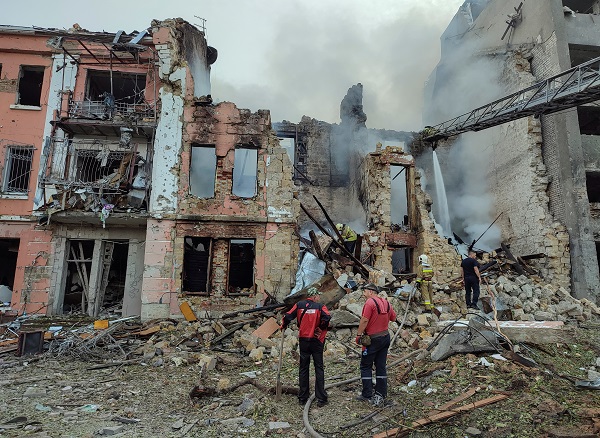 Rescuers work at a site of a residential building heavily damaged by a Russian missile attack, in Mykolaiv, Ukraine, 20 July 2023;
Credit: Reuters/Viktoria Lakezina
Rescuers work at a site of a residential building heavily damaged by a Russian missile attack, in Mykolaiv, Ukraine, 20 July 2023;
Credit: Reuters/Viktoria Lakezina
(Reuters) - Russian strikes on Ukrainian port areas continued on Thursday 20 July 2023, local authorities said, after Moscow warned that ships heading to Ukraine's Black Sea ports could be considered military targets.
As concerns grew over Russia pulling out of a deal that has protected global shipments of Ukrainian grain, authorities in the Mykolaiv and Odesa regions reported some 20 people injured in the strikes.
With Russia's exit from the year-old threatening to worsen global food supplies, Ukraine said on Wednesday 19 July 2023 that it was establishing a temporary shipping route via Romania, a neighbouring Black Sea country.
"Its goal is to facilitate the unblocking of international shipping in the north-western part of the Black Sea," Vasyl Shkurakov, Ukraine's acting minister for communities, territories and infrastructure development, said in a letter to the UN's International Maritime Organization.
Ukraine and Russia are among the world's top grain exporters. US wheat futures jumped 8.5% on Wednesday, their biggest daily gain since days after Russia's invasion of its neighbour on 24 February 2022.
Russia's Defence Ministry said flag states of ships travelling to Ukrainian ports would be considered parties to the conflict on Ukraine's side.
Zelensky decries "Russian terror"
After the last ship left Ukraine on Sunday 16 July 2023 under the Black Sea Grain Initiative, Russia attacked the Odesa region on Monday and Tuesday nights. The region's three ports had been the only ones operating in Ukraine under the grain deal.
Grains terminals and an industrial facility, warehouses, shopping malls, residential and administrative buildings and cars were damaged on Tuesday night, Ukrainian officials said.
Ukraine's southern military command said Russia had used supersonic missiles, including the Kh-22 that was designed to take out aircraft carriers, to hit Odesa's port infrastructure.
"In the ports that were attacked there was about a million tonnes of food stored," Ukrainian President Volodymyr Zelensky said in his nightly address on Wednesday. "It is precisely that amount that should already have been delivered to consumer countries in Africa and Asia."
"In the terminal damaged the most from Russian terror tonight, 60,000 tonnes of agricultural products were stored, intended for shipment to China," Zelensky said.
Early on Thursday, at least eighteen people were wounded in the strike on the port city of Mykolaiv, the regional governor said, while an Odesa official said two people had been hospitalised after a strike caused a fire.
Reuters could not independently verify the Ukrainian claims.
US officials have information indicating Russia laid additional sea mines in the approaches to Ukrainian ports in what appeared to be "a coordinated effort to justify any attacks against civilian ships in the Black Sea and lay blame on Ukraine for these attacks," said White House National Security Council spokesperson Adam Hodge.
Russia did not immediately comment on the US assertion.
Putin presses demands
Russian President Vladimir Putin accused Western countries of "perverting" the grain deal, brokered by the United Nations and Turkey.
The International Monetary Fund on Wednesday said Russia's exit from the deal threatens to worsen global food insecurity and could increase food prices, especially in poor countries.
Putin said Russia would immediately return to the pact if Moscow's conditions were met, easing curbs on its exports of food and fertiliser. Western countries call this an attempt to leverage food supplies to weaken financial sanctions, which still allow Russia to sell food.
Away from the ports, fighting continued on Wednesday in eastern and southern Ukraine where Kyiv's counteroffensive is trying to reclaim territory occupied by Russian forces. The Russians have dug into a heavily fortified front line.
In Washington, the Pentagon announced additional security assistance for Ukraine, totalling about $1.3 billion, with the package including air defence capabilities and munitions.
In Brussels, European Union foreign ministers are expected to discuss a proposal on Thursday to spend up to €20 billion on weapons, ammunition and other military aid for Ukraine over four years.









